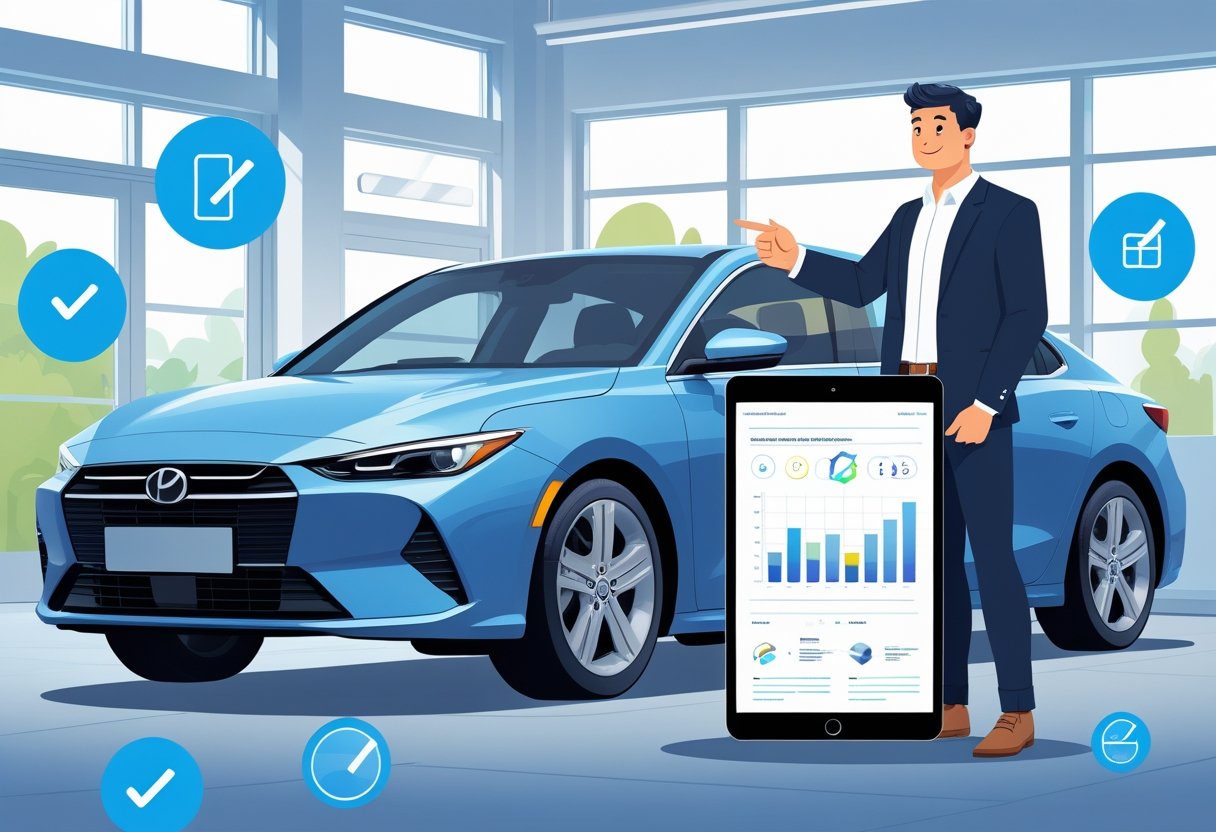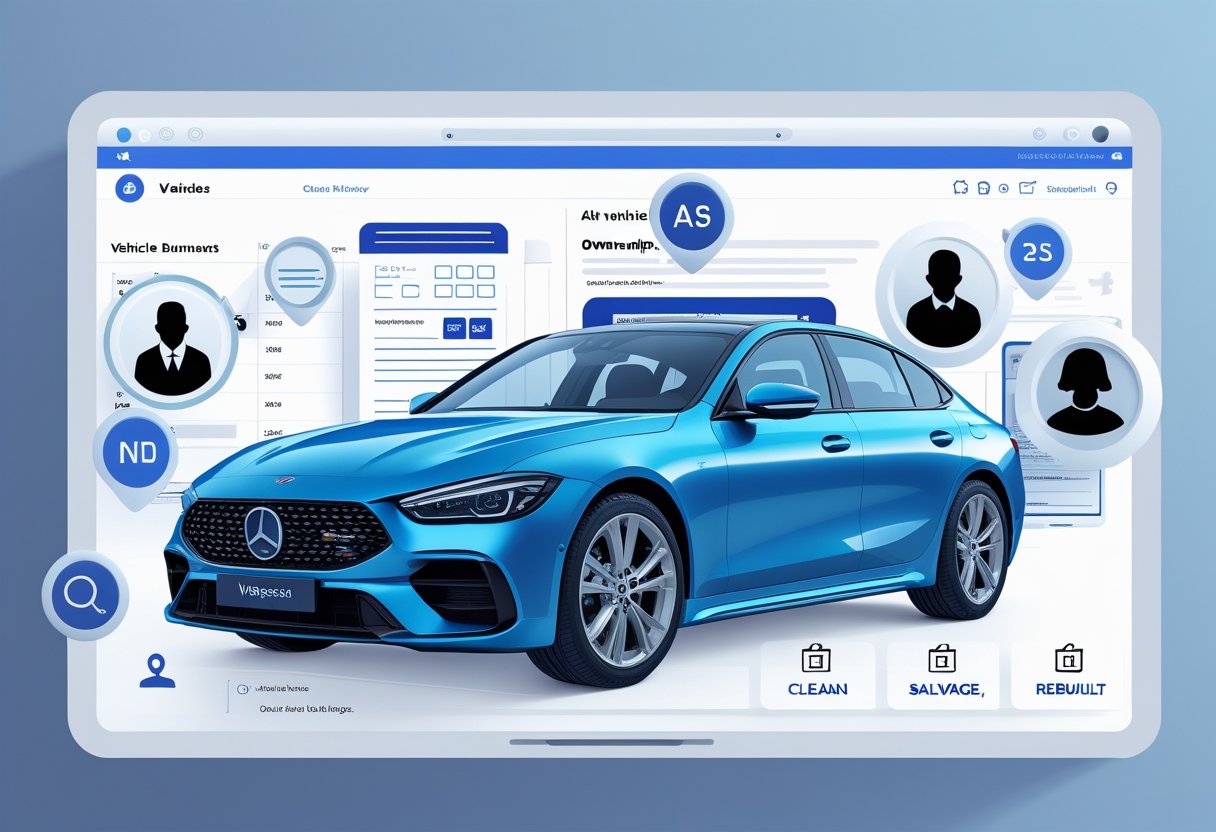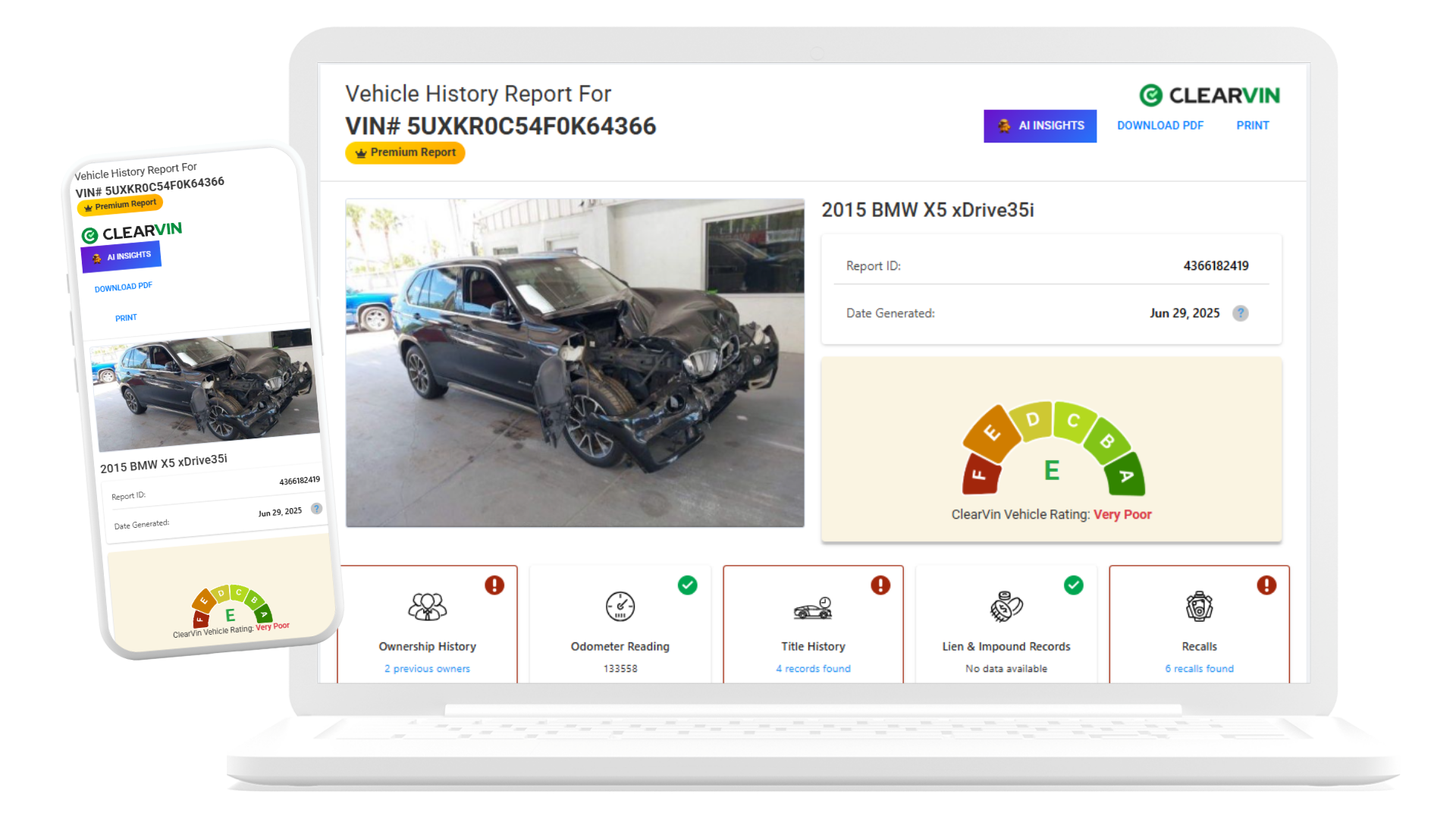
Why Every Used Car Buyer Needs a Vehicle History Report in 2025
Why Every Used Car Buyer Needs a Vehicle History Report in 2025

The Hidden Risks of Buying a Used Car
Buying a used car in 2025 carries more risks than ever. Millions of vehicles change owners every year, and without a vehicle history report, buyers face hidden problems such as accident damage, odometer fraud, and flood-damaged cars. These issues can easily lead to thousands of dollars in unexpected repairs.
What a Vehicle History Report Reveals
A vehicle history report works like a complete resume for the car. It provides critical details such as:
Previous accidents and structural damage
Title history (clean, salvage, rebuilt, etc.)
Odometer verification and rollback detection
Maintenance and service records
Number of past owners
This information is often not disclosed by sellers, making the report a vital tool for protection.
Feature | What It Reveals | Why It Matters |
|---|---|---|
🟥 Accident & Structural Damage | Collision history, airbag deployment, frame damage | Hidden damage lowers safety and resale value |
🟦 Odometer Verification | Mileage records, rollback detection | Prevents fraud and overpaying |
🟩 Title Issues | Salvage, flood, lemon, theft, liens | Affects legal ownership, insurance, financing |
🟨 Flood & Fire Damage | Insurance claims, title washing, repair history | Major hidden risks, costly long-term repairs |
🟪 Maintenance Records | Oil changes, major repairs, inspections | Shows responsible ownership and predicts future costs |
🟧 Ownership History | Number of owners, fleet/rental history | Helps judge how well the car was treated |
⬛ Theft Records | Stolen or recovered vehicles | Protects buyers from legal complications |
🟫 Market Value Impact | Accident/fraud history lowers value | Useful in negotiation and fair pricing |
How a Vehicle History Report Protects Buyers
A vehicle history report gives buyers facts that visual inspections and test drives cannot reveal. By using verified data, buyers can:
Avoid overpaying for vehicles with hidden issues
Detect serious problems that may affect safety
Make smarter, more confident purchase decisions
Vehicle History Reports in 2025: Essential Protection
Smart buyers use a vehicle history report as their first line of defense before signing any paperwork. In 2025, with AI-powered services like VINspectorAI, these reports are faster, more affordable, and easier to understand than ever before.
✅ Key Takeaway: A vehicle history report is not just a document—it’s your guarantee of safety and transparency. It protects you from fraud, hidden damage, and costly mistakes when buying a used car.
Uncovering Accident and Structural Damage
Vehicle history reports reveal accident history that sellers often hide or downplay. Even minor accidents can cause structural damage that affects safety and resale value.
Reports show when insurance companies filed claims for collision damage. They also indicate if airbags deployed during crashes. Frame damage appears in these records when repair shops report it to insurance companies.
Structural damage weakens a car's ability to protect passengers in future accidents. It also causes uneven tire wear and handling problems. Cars with accident history lose 20-40% of their value compared to clean vehicles.
CARFAX and AutoCheck compile data from police reports, insurance claims, and repair facilities. However, not all accidents appear in these databases. Minor fender-benders that owners pay for privately might not show up in VHR records.
Detecting Odometer Fraud and Inaccurate Mileage
Odometer fraud costs used car buyers billions of dollars each year. Dishonest sellers roll back odometer readings to make cars appear less used than they actually are.
Car history reports track odometer readings from inspections, registrations, and service visits. They show if mileage decreased between readings or jumped unusually high amounts.
Red flags for odometer tampering include:
Mileage going backward between records
Gaps of several years with no recorded readings
Wear on pedals and steering wheel that doesn't match low mileage
Service stickers showing higher mileage than the odometer
Digital odometers are harder to tamper with than older mechanical ones. But criminals still find ways to alter electronic systems. VHR data helps buyers spot these illegal modifications before purchasing.
Revealing Title Issues and Salvage History
Title problems create legal and financial headaches for used car buyers. Vehicle history reports show title status including salvage, flood, and lemon designations that affect value and insurability.
Salvage titles mean insurance companies declared the car a total loss due to damage, theft, or flooding. These vehicles get rebuilt and resold but carry significant risks. Many buyers don't realize they're purchasing salvage cars until problems arise.
Flood damage causes electrical problems, rust, and mold that appear months or years later. Cars from hurricane areas often get shipped to other states with clean titles through title washing schemes.
Lemon law buybacks indicate manufacturers repurchased vehicles due to unfixable defects. These cars return to market with branded titles in some states but clean titles in others.
Banks often refuse to finance cars with branded titles. Insurance companies may deny coverage or pay reduced claims for salvage vehicles.
Understanding Maintenance and Service Records
Service records reveal how well previous owners maintained their vehicles. VHR reports include maintenance history from dealerships and chain repair shops that report to databases.
Regular oil changes, brake service, and scheduled maintenance indicate responsible ownership. Gaps in service history suggest neglect that leads to expensive repairs later.
Some reports show specific services performed with dates and mileage. This helps buyers verify if major maintenance items like timing belts or transmission service are due soon.
However, many independent mechanics don't report to these databases. Cars with complete service records at smaller shops might appear poorly maintained in VHR reports. Buyers should ask sellers for receipts from independent repair facilities.
Maximizing Value and Safety When Buying a Used Car
A vehicle history report protects car buyers from hidden damage and ownership problems while providing key information for price negotiations. Fire damage, flood issues, and theft records can significantly affect both safety and resale value.
Identifying Fire and Flood Damage Risks
Fire and flood damage create serious safety risks that are not always visible during a test drive. Vehicle history reports reveal these critical problems before buyers make a purchase.
Fire damage affects electrical systems, engine components, and safety features. Even minor fires can weaken metal parts and create ongoing problems. Insurance companies often declare fire-damaged cars as total losses.
Flood damage is especially dangerous because water damages electronics and creates rust. Cars from flooded areas may work fine initially but develop expensive problems later. Vehicle history reports tell you about accidents and flood damage that previous owners may not disclose.
Common flood damage signs include:
Musty odors in the interior
Water stains on upholstery
Rust in unusual places
Electrical problems
Used cars with flood or fire history sell for much less than clean vehicles. Buyers should avoid these cars completely due to safety concerns and future repair costs.
Verifying Ownership History and Theft Report
Ownership history reveals important details about how previous owners treated the vehicle. Multiple owners in a short time period often signal mechanical problems or other issues.
A clean ownership history shows responsible maintenance and care. Cars with fewer owners typically have better maintenance records and fewer problems. Vehicle history reports tell you who has owned the car and help buyers make informed decisions.
Theft reports are equally important for vehicle identification and legal protection. Stolen cars create serious legal problems for new buyers. Law enforcement can seize stolen vehicles even from innocent purchasers.
Key ownership details to check:
Number of previous owners
Length of ownership periods
Fleet or rental car history
wTheft recovery status
Cars with theft history may have damaged ignition systems or other security features. These vehicles often have lower resale values and ongoing mechanical issues.
Supporting Price Negotiation and Buyer Confidence
Vehicle history reports provide concrete evidence for price negotiations with sellers. Problems revealed in the report justify lower offers and help buyers avoid overpaying.
Accident history significantly reduces vehicle value even after proper repairs. Buyers can use this information to negotiate fair prices based on the car's actual condition. Vehicle history reports are important tools for understanding true market value.
Service records show proper maintenance and help justify higher prices for well-maintained vehicles. Regular oil changes and scheduled maintenance indicate responsible ownership.
Negotiation advantages include:
Documented accident history
Maintenance record gaps
Previous repair costs
Market value comparisons
Car buyers gain confidence knowing the complete vehicle history before making offers. This knowledge prevents expensive surprises and helps secure fair deals on used cars.
Frequently Asked Questions
Get answers to common questions about Why Every Used Car Buyer Needs a Vehicle History Report in 2025
Uncover Complete Vehicle History Reports
Discover critical vehicle information before you buy. Our VIN decoder reveals accident records, title status, recalls, and service history to help you make informed decisions.
Related Articles
Explore Tags
More from Automotive Technology

Get a 100% free auto history check with VinspectorAI. No hidden fees. Uncover accidents, ownership, theft & more. Test our full AI analysis with a free demo!
Transparent VIN checks build trust in auto sales. Give buyers clear vehicle history reports & integrate checks for confident, informed car purchases.

VINspectorAI uses AI to uncover accidents, fraud, recalls & true value — ensuring safe, smart purchases. Why You Should Check a Car’s, check now with vinspectorai.
